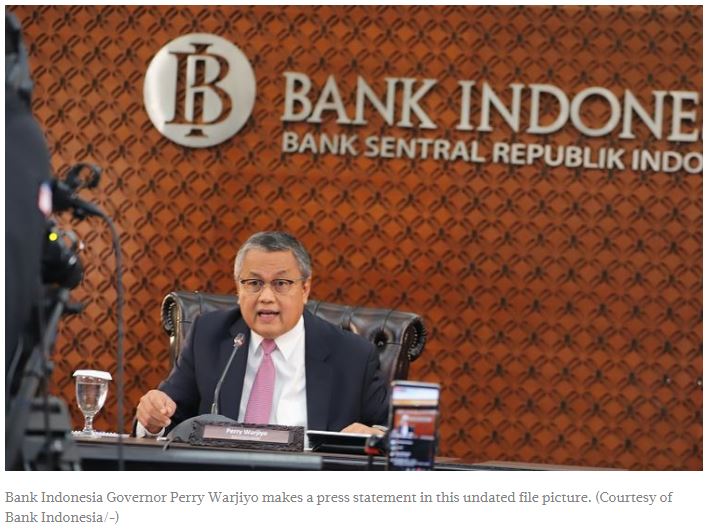Indonesia: BI holds rate at 4% to ensure rupiah stability as central bank’s independence put in spotlight
Bank Indonesia (BI) has decided to leave its interest rate unchanged to safeguard financial market stability as the current coronavirus-induced economic downturn and concerns over the central bank’s independence weigh on the currency.
The benchmark seven-day reverse repo rate will remain at 4 percent, while deposit facility and lending facility rates were also kept at 3.25 and 4.75 percent, the central bank said following its two-day policy meeting on Thursday, “This decision took into account the need to maintain the stability of the rupiah exchange rate amid the low inflation expectation,” BI Governor Perry Warjiyo told reporters in a press briefing on Thursday.
“BI will undertake quantitative measures through liquidity provisions, including BI’s support of the government’s budget absorption to boost economic recovery from the COVID-19 pandemic.”
A proposal by the House of Representatives to revise BI laws and a reintroduction of large-scale social restrictions (PSBB) in Jakarta to curb the virus outbreak have knocked around 1.6 percent off the rupiah exchange rate against the greenback since the end of July. The rupiah appreciated 0.02 percent to 14,840 per US dollar shortly after the central bank’s announcement.
“BI will continue to strengthen the rupiah exchange rate stabilization policy in line with its fundamentals and smooth functioning of the market through monetary operations and liquidity availability,” Perry went on to say.
The proposal by the House includes significant changes to the 1999 BI Law, including giving the central bank a mandate to support economic growth and job creation in addition to maintaining the rupiah’s stability. The bill also proposes the creation of a monetary council, led by the finance minister, to coordinate the government’s and the central bank’s policies, sparking concerns over BI’s independence.
Perry reiterated the words of President Joko “Jokowi” Widodo and Finance Minister Sri Mulyani Indrawati that the central bank would “remain credible, effective and independent”.
“The President and finance minister have made clear that Bank Indonesia will remain independent,” he said.
BI has trimmed the policy rate four times this year by 1 percent, cut the reserve requirement ratio, eased lending rules and purchased sovereign debt papers in the primary market to support the economy amid the coronavirus pandemic.
The central bank will extend the cut of the reserve requirement by 50 bps until June next year for banks that provide loans to micro, small and medium businesses and export-import oriented businesses, among others, after the policy was previously set to end by the end of this year, Perry said.
The central bank has bought Rp 99 trillion (US$6.63 billion) worth of government bonds through private placement and has also bought Rp 44.38 trillion in government bonds through the primary market as part of the burden sharing scheme with the government. It has also bought Rp 48.03 trillion through the primary market, private placement and greenshoe options to help fund the fiscal deficit.
The government is seeking the central bank’s help to fund the fiscal deficit and bear the debt burden through a $40 billion burden sharing scheme, which will see the central bank buying at least $28 billion.
The government has allocated Rp 695.2 trillion for stimulus to rescue an economy reeling from the coronavirus pandemic, widening the budget deficit to 6.34 percent of GDP to account for larger government spending and lower state revenue due slowing economic activity.
Indonesia’s economy is widely expected to enter a recession in the third quarter this year after declining 5.32 percent in the second quarter, with the government expecting the economy to shrink 1.1 percent at worst this year or grow by only 0.2 percent at best.
The central bank decided not to comment regarding this year’s GDP estimate but said the economy may grow by 4.8 to 5.8 percent next year.
The risk of the deeper economic contraction coupled with the prospect of the prolonged spread of the virus in Indonesia, has driven the market to be more volatile than before and may jeopardize the rupiah’s stability, University of Indonesia economist Teuku Riefky said.
“BI’s decision to maintain its macroprudential policy and expand the unconventional monetary policy measures will prompt liquidity and thus promote economic growth,” he wrote in a note, adding that the current rate remained attractive to maintain capital inflows and ensure the rupiah’s stability.
The new BI bill proposal is ill-designed and ill-advised, according to CIMB Niaga chief economist Adrian Panggabean, adding that the country had four policy instruments to promote economic growth and jobs, namely monetary policy, fiscal policy, income policy, as well as trade and industry policy.
“So far, fiscal policy has been ineffective and the latter two have been conspicuously mute,” he told The Jakarta Post, calling for the government to expedite spending to support the economy.
Source: https://www.thejakartapost.com/news/2020/09/17/bi-holds-rate-at-4-to-ensure-rupiah-stability-as-central-banks-independence-put-in-spotlight.html


 English
English




